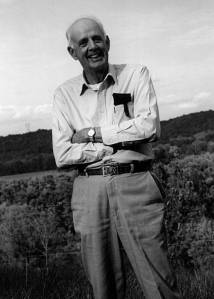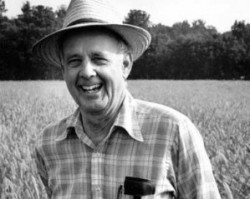 If one knows anything for certain about writer Wendell Berry, it is that he is a man of ideals and deeply held convictions. Throughout his long career spanning countless novels, short stories, poems, and essays Berry has written extensively about what he believes constitutes a life worth living. Key among Berry’s beliefs is the idea that life and land are interconnected and integral to happiness and well-being. The author, who is also a longtime farmer, is well known for his beliefs in the benefits (ecological, economic, spiritual) of an agrarian way of life, and has long argued that a return to a more agrarian-based culture is necessary for the health of our society. He is extraordinarily cautious, even wary, of much of modern technology and the threats it poses to humanity in terms of industrialization and environmental destruction. So it should come as little surprise to any thinking or reasoning person that Mr. Berry was a bit heated upon finding that the University of Kentucky (Berry’s alma mater and recipient of his enormous collection of personal archives) had decided to name its new athletic dorm the Wildcat Coal Lodge in a nod to the school’s coal industry donors.
If one knows anything for certain about writer Wendell Berry, it is that he is a man of ideals and deeply held convictions. Throughout his long career spanning countless novels, short stories, poems, and essays Berry has written extensively about what he believes constitutes a life worth living. Key among Berry’s beliefs is the idea that life and land are interconnected and integral to happiness and well-being. The author, who is also a longtime farmer, is well known for his beliefs in the benefits (ecological, economic, spiritual) of an agrarian way of life, and has long argued that a return to a more agrarian-based culture is necessary for the health of our society. He is extraordinarily cautious, even wary, of much of modern technology and the threats it poses to humanity in terms of industrialization and environmental destruction. So it should come as little surprise to any thinking or reasoning person that Mr. Berry was a bit heated upon finding that the University of Kentucky (Berry’s alma mater and recipient of his enormous collection of personal archives) had decided to name its new athletic dorm the Wildcat Coal Lodge in a nod to the school’s coal industry donors.
Given the stunning amount of human and environmental degradation  (mountaintop removal, air and water pollution, destruction of woodlands and soil) caused in the state by coal mining and Berry’s stern and passionate support of the environmental health of the Earth and his homeland of Kentucky it is easy to understand his anger. As a result of the university’s relationship with the coal industry, Berry, perhaps Kentucky’s best known author, has ended his association with the school and decided to move his voluminous archives elsewhere. The papers, which number at about 100 boxes worth (Berry is nothing if not prolific), will be moved from the university to the Kentucky Historical Society. For more information, visit the Lexington Herald-Leader, which has been following the story. You can also read an essay by Berry about the unfortunate impact and high cost of coal on our natural world at the website iLoveMountains.org. If you’re interested in reading more of Berry’s essays, novels, or poetry stop by EPL anytime and check out our collection.
(mountaintop removal, air and water pollution, destruction of woodlands and soil) caused in the state by coal mining and Berry’s stern and passionate support of the environmental health of the Earth and his homeland of Kentucky it is easy to understand his anger. As a result of the university’s relationship with the coal industry, Berry, perhaps Kentucky’s best known author, has ended his association with the school and decided to move his voluminous archives elsewhere. The papers, which number at about 100 boxes worth (Berry is nothing if not prolific), will be moved from the university to the Kentucky Historical Society. For more information, visit the Lexington Herald-Leader, which has been following the story. You can also read an essay by Berry about the unfortunate impact and high cost of coal on our natural world at the website iLoveMountains.org. If you’re interested in reading more of Berry’s essays, novels, or poetry stop by EPL anytime and check out our collection.
And finally, while the debate about climate change and the environment somehow still muddles on with much gnashing of teeth and dragging of feet, I’d like to offer a humble tip of the cap to Wendell Berry for his steadfast commitment to environmentalism, community, local agriculture, and a sustainable vision for society. In times such as these, those standing patiently and unwaveringly by their convictions are deserving of our highest praise.
